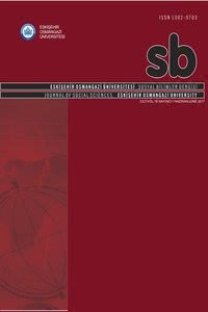BULANIK BÜTÇELEME VE BULANIK BÜTÇE KONTROLU
FUZZY BUTGETING AND FUZZY BUTGETARY CONTROL
___
- Bojadziev G., M. Bojadziev, (1999). Fuzzy Logic For Business, Finance and Management, Singopore, World Scientific Pub. Co. Pte. Ltd..
- Chan, L., Y. Yuan, (1990). Dealing with Fuzziness in Cost-Volume-Profit Analysis, Journal of Accounting and Economics, V: XII, N:4, 83-95.
- Chiu, C.-Y., C.S., (1998). Park, Capital Budgeting Decisions with Fuzzy Projects, The Enginnering Economist, V: XXXXII, N: 2, 125-150.
- Evans, G.W., W. Karwowski, (1989). M.R. Wilhelm, Applications of Fuzzy Set Methodoligies in Industrial Engineering, Amsterdam, Elsevier Science Publishers B.V..
- Garrison, R.H., (1982). Managerial Accounting(3.Ed.),Business Pub. Inc.,N.Y.
- Gögüş, Ö, T.O., (1998). Boucher, Fuzzy NCIC, The Enginnering Economist, V: XXXXIII, N:3, 203-246.
- Jang R.J.,C.Sun, E. Muzutani, 1997. Neuro-Fuzzy and Soft Computing, Prentice Hall, N.J..
- Kandel, A., (1986). Fuzzy Mathematical Techniques with Applications, Massachusetts, Addison-Wesley Pub. Comp..
- Karsak, E. E., (1998). Measures of Liquidity Risk Supplementing Fuzzy Discounted Cash Plan Analysis, The Engineering Economist, V:XXXXIII, N: 4, 331-344.
- Kasko,B., (1993). Fuzzy Thinking: The New Science of Fuzzy Logic, N.Y.
- Klir, G.J., T.A., (1988). Folger, Fuzzy Sets, Uncertainty, and Information, N.J. Prentice Hall.
- Kuchta, D., (2001). A Fuzzy Model For R&D Project Selection with Benefit, Outcome and Resource Interactions, The Engineering Economist, V: XXXXIII, N: 3, 164-180.
- Moore, C.L., R.K. Jaedicke, (1988). Yönetim Muhasebesi Çev: Alparslan Peker, İ.Ü Yayın No :3486, İstanbul.
- Mukaidono, M., (2001). Fuzzy Logic For Beginners, World Scientific Pub. Co., Singopore.
- Tarrazo, M., L., (2000). Gutierrez, Economic Expectations, Fuzzy Sets and Financial Planing, European Journal of Operating Research, V:126, N:
- Ting, D.P.K. ve diğerleri, (1999). Product and Process Cost Estimation With Fuzzy Multi-Attribute Utility Thoery, The Enginnering Economist, V: XXXXIV, N:4, 303-313.
- Turban,E., (1993). Decision Support and Expert Systems, 3. Ed., Macmillan Pub. Co..
- Umapathy, S., (1987). Current Budgeting Practies In U.S. Industry: The State of the Art, Quorum Books, N.Y..
- Zadeh, L.A., (1981). A Meaning Representation Language for Natural Languages, E.H. Mamdani, B.R. Gaines (Ed.), Fuzzy Reasoning and Its Applications, London, Academic Press Inc..
- Zadeh L.A., (1987a) . Fuzzy Sets, R.R.Yager ve Diğerleri (Ed.), Fuzzy Sets and Applications: Selected Papers by L.A.Zadeh, N.Y., John Wiley & Sons.
- Zadeh, L.A., (1987b). The Concept of a Linguistic Variable and Its Application to Approximate Reasoning-1, R R.R.Yager ve Diğerleri (Ed.), Fuzzy Sets and Applications: Selected Papers by L.A.Zadeh, N.Y., John Wiley & Sons.
- Zadeh, L.A., (2000). Toward a Logic of perceptions Based on Fuzzy Logic, V. Novak, I. Perfilieva (Ed.), Physica-Verlag Heidelberg.
- Yayın Aralığı: 3
- Başlangıç: 2000
- Yayıncı: -
Bulanık Bütçeleme ve Bulanık Bütçe Kontrolü
İhracat Teşviklerinin Etkinliğini Ölçmeye Yönelik Bir Analiz: Bilecik ve Eskişehir Örneği
Mevlüdiye Şimşek ve Resul Yazıcı
KONJOİNT ANALİZİ VE ÖZEL DERSANE TERCİHİNE YÖNELİK BİR UYGULAMA
Deutschsprachige Literatur Von Turken in Der Schweiz-Eıne “Andere” Literatur?
İŞLETMELERDE BİR REKABET AVANTAJI KAYNAĞI OLARAK ÖZ YETENEK KEŞİF MATRİSİ VE GELİŞİM ROTASI
Siyasetnâmeler’in Klasik Kaynakları
KKTC’DE TURİZM ENDÜSTRİSİNİN STRATEJİK ANALİZİ
TÜKETİCİ ETİĞİ: ÜLKELERARASI KARŞILAŞTIRMALARA VE DEMOGRAFİK FAKTÖRLERE DAYALI BİR ARAŞTIRMA
